The aluminum casing of the blade battery industry is set to expand from USD 241.2 million in 2025 to USD 444.2 million by 2035, at a CAGR of 6.4%. Such growth is not only linked to rising electric vehicle adoption but also to the resilience and efficiency of supply chains. The industry depends heavily on secure aluminum sourcing, energy-intensive smelting operations, and precision casting technologies. Any disruption in bauxite availability, electricity pricing, or cross-border trade restrictions could affect cost structures and delivery reliability. Hence, companies will be compelled to diversify raw material supply bases, adopt recycling streams, and negotiate long-term contracts with mining and metal processing entities. The strategic positioning of smelters near gigafactories is expected to play a vital role in balancing transportation cost pressures.
During the 2025–2030 phase, value addition of USD 86.1 million will be supported by incremental EV production. However, securing high-strength alloys in consistent grades and maintaining process reliability will dictate profit margins. Fabricators are expected to embrace digitalized production tracking, predictive maintenance of extrusion lines, and automated quality checks to reduce downtime. Cost-competitive manufacturing will rely on reducing scrap rates and achieving higher throughput in casing fabrication. Logistics bottlenecks, especially on trans-Pacific routes, will remain a concern, prompting OEMs to consider nearshoring or localizing key enclosure production.
Between 2030 and 2035, the industry adds another USD 116.9 million in size, with a higher share of this growth driven by scale economies. Recycling of end-of-life EV batteries and reprocessing of aluminum casings will become mainstream, offering a hedge against raw material volatility. Cost efficiency will no longer depend only on smelting operations but also on integration into closed-loop recycling systems. Trade policies and carbon pricing in major producing regions like China, the EU, and North America will further determine competitiveness. Manufacturers who succeed in balancing cost-efficient operations with localized, resilient supply chains will capture disproportionate market share.
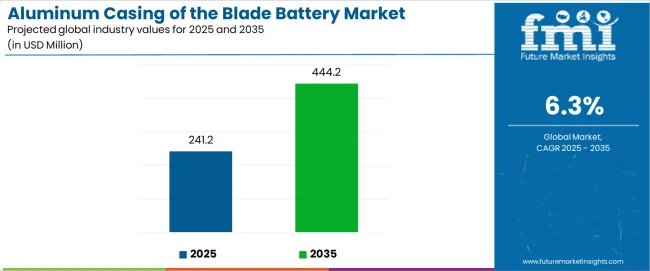
The Aluminum Casing of the Blade Battery market demonstrates distinct growth phases with varying market characteristics and competitive dynamics. Between 2025 and 2030, the market progresses through its technology adoption phase, expanding from USD 241.2 million to USD 327.3 million with steady annual increments averaging 6.3% growth. This period showcases the transition from conventional aluminum formulations to advanced high-strength systems with enhanced structural capabilities and integrated quality control systems becoming mainstream features.
The 2025-2030 phase adds USD 86.1 million to market value, representing 42% of total decade expansion. Market maturation factors include standardization of electric vehicle and energy storage protocols, declining component costs for specialized aluminum formulations, and increasing industry awareness of casing benefits reaching 95-98% structural effectiveness in automotive and battery applications. Competitive landscape evolution during this period features established aluminum companies like BYD and Shenzhen Xindongda Technology expanding their product portfolios while specialty manufacturers focus on advanced material development and enhanced structural capabilities.
From 2030 to 2035, market dynamics shift toward advanced material integration and global manufacturing expansion, with growth continuing from USD 327.3 million to USD 444.2 million, adding USD 116.9 million or 58% of total expansion. This phase transition centers on specialized aluminum casing systems, integration with automated manufacturing networks, and deployment across diverse electric vehicle and energy storage scenarios, becoming standard rather than specialized applications. The competitive environment matures with focus shifting from basic structural capability to comprehensive manufacturing optimization systems and integration with production monitoring platforms.
At-a-Glance Metrics
| Metric | Value |
|---|---|
| Market Value (2025) | USD 241.2 million |
| Market Forecast (2035) | USD 444.2 million |
| Growth Rate | 6.3% CAGR |
| Leading Technology | High Strength Type Product |
| Primary Application | Electric Vehicles Segment |
The aluminum casing of the blade battery market demonstrates strong fundamentals with high-strength aluminum systems capturing a dominant share through advanced material strength and production optimization capabilities. Electric vehicle applications drive primary demand, supported by increasing battery production and automotive manufacturing technology requirements. Geographic expansion remains concentrated in developed markets with established automotive infrastructure, while emerging economies show accelerating adoption rates driven by electric vehicle manufacturing expansion and rising battery production standards.
Market expansion rests on three fundamental shifts driving adoption across the electric vehicle, energy storage, and automotive sectors. First, electric vehicle production demand creates compelling operational advantages through aluminum casings that provide immediate battery protection and structural integrity without production delays, enabling manufacturers to meet stringent quality standards while maintaining manufacturing productivity and reducing operational costs. Second, energy storage system modernization accelerates as battery facilities worldwide seek advanced aluminum systems that complement traditional battery enclosure processes, enabling precise manufacturing and quality control that align with industry standards and safety regulations.
Third, automotive manufacturing enhancement drives adoption from electric vehicle facilities and battery producers requiring effective structural solutions that minimize failures while maintaining operational productivity during assembly and component integration operations. However, growth faces headwinds from raw material cost challenges that vary across aluminum suppliers regarding the sourcing of high-purity aluminum alloys and specialty materials, which may limit adoption in cost-sensitive environments. Technical limitations also persist regarding material compatibility and environmental conditions that may reduce effectiveness in extreme temperature manufacturing environments, which affect structural performance and material consistency.
The aluminum casing of the blade battery market represents a specialized yet critical material opportunity driven by expanding global electric vehicle production, energy storage infrastructure modernization, and the need for superior structural effectiveness in diverse automotive applications. As manufacturers worldwide seek to achieve 95-98% structural effectiveness, reduce production defects, and integrate advanced aluminum systems with automated platforms, aluminum casings are evolving from basic enclosure materials to sophisticated structural solutions ensuring production quality and operational efficiency.
The aluminum casing of the blade battery market's growth trajectory from USD 241.2 million in 2025 to USD 444.2 million by 2035 at a 6.3% CAGR reflects fundamental shifts in battery manufacturing quality requirements and aluminum material optimization. Geographic expansion opportunities are particularly pronounced in China and India markets, while the dominance of high-strength aluminum systems (62.0% market share) and electric vehicle applications (58.0% share) provides clear strategic focus areas.
Strengthening the dominant high-strength segment (62.0% market share) through enhanced aluminum formulations, superior structural resistance, and automated manufacturing systems. This pathway focuses on optimizing alloy composition, improving material consistency, extending operational effectiveness to 95-98% success rates, and developing specialized formulations for diverse applications. Market leadership consolidation through advanced material engineering and automated production integration enables premium positioning while defending competitive advantages against alternative materials. Expected revenue pool: USD 45-60 million
Rapid electric vehicle and battery growth across China (8.5% CAGR) creates substantial expansion opportunities through local production capabilities and technology transfer partnerships. Growing battery production and government electric vehicle initiatives drive sustained demand for advanced aluminum casing systems. Localization strategies reduce import costs, enable faster technical support, and position companies advantageously for procurement programs while accessing growing domestic markets. Expected revenue pool: USD 38-52 million
Expansion within the dominant electric vehicle segment (58.0% market share) through specialized formulations addressing automotive quality standards and high-volume production requirements. This pathway encompasses automated manufacturing systems, quality control integration, and compatibility with diverse electric vehicle battery processes. Premium positioning reflects superior structural performance and comprehensive automotive compliance supporting modern battery production. Expected revenue pool: USD 35-48 million
Strategic expansion into energy storage system applications (35.0% market share) requires enhanced structural capabilities and specialized aluminum formulations addressing battery operational requirements. This pathway addresses grid-scale battery manufacturing, residential energy storage, and industrial battery systems with advanced material engineering for demanding operational conditions. Premium pricing reflects specialized performance requirements and extended durability standards. Expected revenue pool: USD 28-38 million
Development of specialized conventional aluminum formulations for cost-sensitive applications (38.0% share), addressing specific manufacturing requirements and market segments. This pathway encompasses standard alloy formulations, cost-optimized materials, and alternatives for price-sensitive markets. Material differentiation through optimized formulations enables diversified revenue streams while reducing dependency on premium product platforms. Expected revenue pool: USD 22-30 million
Expansion in high-growth India market (7.9% CAGR) through localized production capabilities and partnerships with domestic electric vehicle manufacturers. This pathway encompasses technology transfer, local supply chain development, and cost-effective solutions for emerging market requirements. Market development through strategic partnerships enables competitive positioning while accessing rapidly expanding electric vehicle and energy storage markets. Expected revenue pool: USD 18-25 million
Development of environmentally superior aluminum formulations addressing regulatory compliance and sustainability requirements across electric vehicle and energy storage applications. This pathway encompasses recycled aluminum content, sustainable production processes, and comprehensive ecological documentation. Premium positioning reflects environmental leadership and regulatory expertise while enabling access to sustainability-focused procurement programs and green technology partnerships. Expected revenue pool: USD 15-22 million
Primary Classification: The aluminum casing of the blade battery market segments by material type into Conventional Type and High Strength Type categories, representing the evolution from basic aluminum formulations to specialized material solutions for comprehensive automotive optimization.
Secondary Classification: End-use segmentation divides the aluminum casing of the blade battery market into Electric Vehicles and Energy Storage Systems sectors, reflecting distinct requirements for structural performance, application capacity, and manufacturing quality standards.
Regional Classification: Geographic distribution covers China, India, Germany, Brazil, USA, UK, and Japan, with developed markets leading adoption while emerging economies show accelerating growth patterns driven by electric vehicle manufacturing expansion programs.
The segmentation structure reveals technology progression from standard aluminum-based formulations toward specialized material systems with enhanced structural and automation capabilities, while application diversity spans from electric vehicle manufacturing to specialized energy storage applications requiring precise aluminum casing solutions.
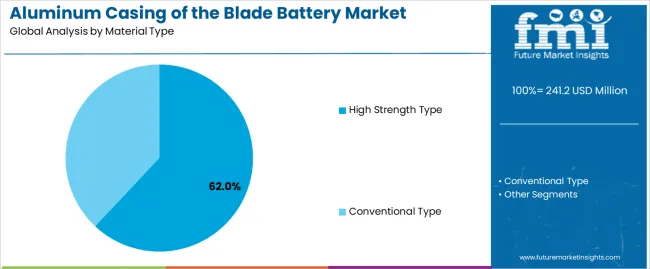
Market Position: High-strength aluminum systems command the leading position in the Aluminum Casing of the Blade Battery market with approximately 62.0% market share through advanced material strength features, including superior structural resistance, lightweight design capability, and production optimization that enable manufacturers to achieve optimal battery protection across diverse electric vehicle and energy storage environments.
Value Drivers: The segment benefits from manufacturer preference for reliable material systems that provide consistent structural performance, reduced production defects, and manufacturing efficiency optimization without requiring significant process modifications. Advanced material features enable automated manufacturing systems, structural consistency, and integration with existing battery assembly equipment, where material performance and production reliability represent critical operational requirements.
Competitive Advantages: High-strength aluminum systems differentiate through proven material stability, consistent structural characteristics, and integration with automated manufacturing systems that enhance operational effectiveness while maintaining optimal quality suitable for diverse electric vehicle and battery applications.
Key market characteristics:
Conventional aluminum casing systems maintain a significant 38.0% market share in the Aluminum Casing of the Blade Battery market due to their cost-effective material properties and versatile application advantages. These systems appeal to manufacturers requiring standard aluminum materials with adequate structural resistance for standard battery enclosure applications.
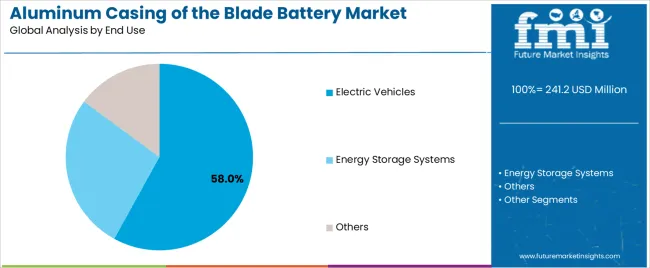
Market Context: Electric vehicle applications dominate the Aluminum Casing of the Blade Battery market with approximately 58.0% market share due to widespread adoption of aluminum casing systems and increasing focus on battery protection, structural optimization, and manufacturing quality management applications that minimize structural failures while maintaining automotive industry standards.
Appeal Factors: Electric vehicle manufacturers prioritize material reliability, structural consistency, and integration with existing battery manufacturing infrastructure that enables coordinated aluminum casing application across multiple production lines. The segment benefits from substantial automotive industry investment and electrification programs that emphasize the acquisition of aluminum casing systems for quality control and manufacturing efficiency applications.
Growth Drivers: Electric vehicle production expansion programs incorporate aluminum casings as standard materials for battery manufacturing operations, while global automotive electrification increases demand for advanced material capabilities that comply with automotive quality standards and minimize production defects.
Market Challenges: Varying automotive industry standards and battery manufacturing technology differences may limit material standardization across different production facilities or operational scenarios.
Application dynamics include:
Energy storage system applications capture approximately 35.0% market share through specialized structural requirements in grid-scale battery manufacturing, residential energy storage, and industrial battery applications. These facilities demand robust aluminum systems capable of operating in diverse environmental conditions while providing effective structural protection and battery enclosure capabilities.
Others applications account for approximately 7.0% market share, including specialized battery systems, experimental electric vehicle platforms, and niche energy storage requiring aluminum casing capabilities for production optimization and quality control.
Growth Accelerators: Electric vehicle production expansion drives primary adoption as aluminum casings provide battery protection capabilities that enable automotive manufacturers to meet stringent safety quality standards without excessive production delays, supporting manufacturing operations and automotive industry missions that require precise battery enclosure applications. Energy storage system infrastructure demand accelerates market expansion as facilities seek effective structural systems that minimize battery protection failures while maintaining operational effectiveness during battery assembly and energy storage integration scenarios. Automotive manufacturing spending increases worldwide, creating sustained demand for aluminum casing systems that complement traditional manufacturing processes and provide operational flexibility in complex production environments.
Growth Inhibitors: Raw material cost challenges vary across aluminum suppliers regarding the sourcing of high-purity aluminum alloys and specialty materials, which may limit operational flexibility and market penetration in regions with volatile commodity prices or cost-sensitive manufacturing operations. Technical performance limitations persist regarding material compatibility and environmental conditions that may reduce effectiveness in extreme temperature, corrosion exposure, or mechanical stress conditions, affecting structural performance and material longevity. Market fragmentation across multiple automotive specifications and battery standards creates compatibility concerns between different material suppliers and existing production infrastructure.
Market Evolution Patterns: Adoption accelerates in electric vehicle manufacturing and premium energy storage sectors where quality requirements justify material system costs, with geographic concentration in developed markets transitioning toward mainstream adoption in emerging economies driven by automotive manufacturing expansion and battery production development. Technology development focuses on enhanced aluminum formulations, improved environmental resistance, and integration with automated manufacturing systems that optimize battery protection and operational effectiveness. The aluminum casing of the blade battery market could face disruption if alternative enclosure materials or manufacturing processes significantly limit the deployment of aluminum-based casings in electric vehicle or energy storage applications, though the material's unique combination of lightweight properties, structural strength, and thermal management continues to make it irreplaceable in critical applications.
The Aluminum Casing of the Blade Battery market demonstrates varied regional dynamics with Growth Leaders including China (8.5% CAGR) and India (7.9% CAGR) driving expansion through electric vehicle manufacturing capacity additions and battery production programs. Steady Performers encompass Germany (7.2% CAGR) and Brazil (6.6% CAGR), benefiting from established automotive industries and advanced battery technology adoption. Mature Markets feature the USA (6.0% CAGR), UK (5.4% CAGR), and Japan (4.7% CAGR), where specialized electric vehicle applications and battery technology integration support consistent growth patterns.
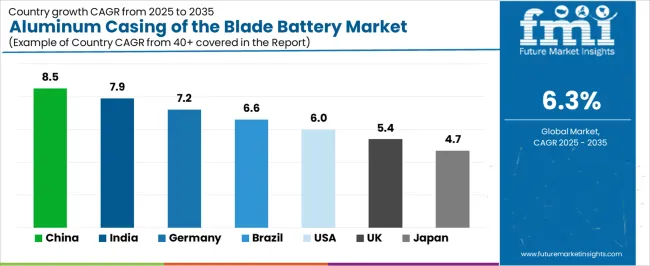
| Country | CAGR (2025-2035) |
|---|---|
| China | 8.5% |
| India | 7.9% |
| Germany | 7.2% |
| Brazil | 6.6% |
| USA | 6.0% |
| UK | 5.4% |
| Japan | 4.7% |
Regional synthesis reveals China and India markets leading adoption through electric vehicle manufacturing expansion and battery production infrastructure development, while Germany and Brazil maintain steady expansion supported by automotive technology advancement and manufacturing standardization requirements. North American markets show moderate growth driven by electric vehicle industry applications and material technology integration trends.
The China market emphasizes advanced aluminum casing features, including precision material control and integration with comprehensive manufacturing platforms that manage production quality, efficiency optimization, and cost control applications through unified monitoring systems. The country demonstrates strongest growth at 8.5% CAGR, driven by electric vehicle manufacturing dominance, battery production capacity expansion, and government policy support for new energy vehicles that support aluminum casing system integration. Chinese battery and automotive manufacturers prioritize operational effectiveness with aluminum casings delivering consistent structural performance through advanced material formulation and manufacturing adaptation capabilities.
Technology deployment channels include major electric vehicle manufacturers like BYD, specialized aluminum suppliers, and battery industry procurement programs that support professional applications for complex battery manufacturing and automotive assembly applications. Manufacturing platform integration capabilities with established battery systems expand market appeal across diverse operational requirements seeking performance and reliability benefits.
Performance Metrics:
India demonstrates robust market development with a 7.9% CAGR, driven by rapid electric vehicle adoption, expanding battery manufacturing infrastructure, and government initiatives supporting domestic EV production across major cities including Mumbai, Delhi, and Chennai. Electric vehicle modernization and battery production requirements drive primary demand, while growing automotive manufacturing sectors create diversified application opportunities. Government Make in India initiatives and EV promotion programs support sustained expansion. The convergence of automotive electrification, battery manufacturing development, and industrial capacity expansion positions India as a key emerging market for aluminum battery casings.
Germany's advanced automotive market demonstrates sophisticated aluminum casing deployment with documented operational effectiveness in electric vehicle manufacturing applications and battery production facilities through integration with existing material systems and production infrastructure. The country leverages engineering expertise in automotive materials and manufacturing systems integration to maintain strong growth at 7.2% CAGR. Industrial centers, including Stuttgart, Munich, and Wolfsburg, showcase premium installations where aluminum casing systems integrate with comprehensive automotive platforms and manufacturing management systems to optimize battery production and structural effectiveness.
German material companies prioritize system reliability and EU compliance in aluminum casing development, creating demand for premium material systems with advanced features, including production monitoring integration and automated manufacturing systems. The aluminum casing of the blade battery market benefits from established automotive infrastructure and a willingness to invest in advanced battery technologies that provide long-term operational benefits and compliance with international automotive and safety standards.
Market Intelligence Brief:
Brazil's expanding automotive market demonstrates comprehensive aluminum casing integration with documented performance effectiveness in electric vehicle manufacturing applications and energy storage facilities through alignment with domestic production systems and infrastructure development. The country leverages regional manufacturing capabilities and government electrification support to maintain robust growth at 6.6% CAGR. Industrial centers, including São Paulo, Rio de Janeiro, and Belo Horizonte, showcase strategic installations where aluminum casing systems integrate with comprehensive automotive platforms and manufacturing management systems to optimize battery production and structural effectiveness.
Brazilian automotive companies prioritize cost-effective solutions and regional compliance in aluminum casing development, creating demand for adaptable material systems with essential features, including production monitoring integration and localized manufacturing systems. The aluminum casing of the blade battery market benefits from established automotive infrastructure and government investment programs supporting advanced battery technologies that provide long-term operational benefits and compliance with emerging Brazilian automotive and environmental standards.
Market Intelligence Brief:
The USA' advanced automotive market demonstrates sophisticated aluminum casing deployment with documented operational effectiveness in electric vehicle manufacturing applications and battery production facilities through integration with cutting-edge material systems and production infrastructure. The country leverages technological innovation and manufacturing scale to maintain strong growth at 6.0% CAGR. Industrial centers, including Detroit, California's Central Valley, and Texas manufacturing corridors, showcase premium installations where aluminum casing systems integrate with comprehensive automotive platforms and advanced manufacturing management systems to optimize battery production and structural effectiveness.
American material companies prioritize technological advancement and regulatory compliance in aluminum casing development, creating demand for innovative material systems with advanced features, including real-time production monitoring integration and automated manufacturing systems.
Market Intelligence Brief:
The UK's evolving automotive market demonstrates strategic aluminum casing integration with documented performance effectiveness in electric vehicle manufacturing applications and battery production facilities through coordination with established material systems and production infrastructure. The country leverages automotive heritage and environmental compliance requirements to maintain consistent growth at 5.4% CAGR. Industrial centers, including Birmingham, Coventry, and northern England manufacturing regions, showcase targeted installations where aluminum casing systems integrate with comprehensive automotive platforms and manufacturing management systems to optimize battery production and structural effectiveness.
British material companies prioritize environmental compliance and quality standards in aluminum casing development, creating demand for sustainable material systems with regulatory features, including environmental monitoring integration and compliant manufacturing systems. The aluminum casing of the blade battery market benefits from established automotive infrastructure and government support for advanced battery technologies that provide long-term operational benefits and compliance with stringent UK automotive and environmental standards.
Market Intelligence Brief:
Japan's sophisticated automotive market demonstrates precision aluminum casing deployment with documented operational effectiveness in electric vehicle manufacturing applications and battery production facilities through seamless integration with advanced material systems and production infrastructure. The country leverages manufacturing excellence and technological sophistication to maintain steady growth at 4.7% CAGR. Industrial centers, including Toyota City, Yokohama, and Hiroshima manufacturing regions, showcase premium installations where aluminum casing systems integrate with comprehensive automotive platforms and precision manufacturing management systems to optimize battery production and structural effectiveness.
Japanese material companies prioritize precision engineering and quality excellence in aluminum casing development, creating demand for high-specification material systems with advanced features, including precision production monitoring integration and automated quality control systems. The aluminum casing of the blade battery market benefits from established automotive infrastructure and continuous investment in advanced battery technologies that provide long-term operational benefits and compliance with rigorous Japanese automotive and industrial standards.
Market Intelligence Brief:
The Aluminum Casing of the Blade Battery market in Europe is projected to grow from USD 48.5 million in 2025 to USD 89.2 million by 2035, registering a CAGR of 6.3% over the forecast period. Germany is expected to maintain its leadership position with a 42.0% market share in 2025, declining slightly to 41.5% by 2035, supported by its advanced automotive manufacturing infrastructure and major electric vehicle production centers in Stuttgart, Munich, and Wolfsburg.
UK follows with a 22.0% share in 2025, projected to reach 22.3% by 2035, driven by comprehensive electric vehicle adoption programs and battery manufacturing development. France holds a 15.0% share in 2025, expected to reach 15.2% by 2035 through specialized automotive applications and energy storage initiatives. Italy commands an 11.0% share, while Spain accounts for 6.0% in 2025. The Rest of Europe region is anticipated to maintain 4.0% in both 2025 and 2035, reflecting steady adoption in Nordic countries and Central & Eastern European automotive manufacturing facilities implementing electrification programs.
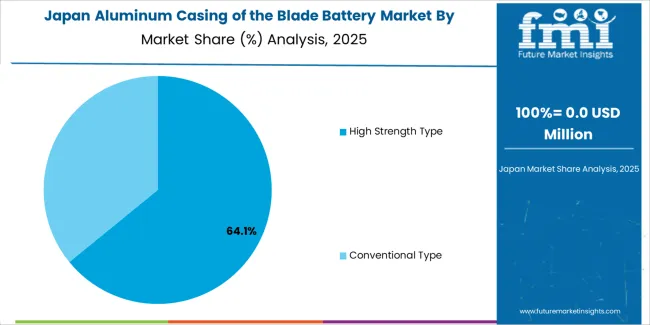
In Japan, the Aluminum Casing of the Blade Battery market prioritizes high-strength aluminum systems, which capture the dominant share of electric vehicle manufacturing and battery production installations due to their advanced features, including precision structural optimization and seamless integration with existing automotive manufacturing infrastructure. Japanese automotive manufacturers emphasize reliability, precision, and long-term operational excellence, creating demand for high-strength systems that provide consistent structural capabilities and adaptive material performance based on manufacturing requirements and environmental conditions. Conventional aluminum materials maintain secondary positions primarily in specialized cost-sensitive applications and standard battery installations where comprehensive structural functionality meets operational requirements without compromising production efficiency.
Market Characteristics:
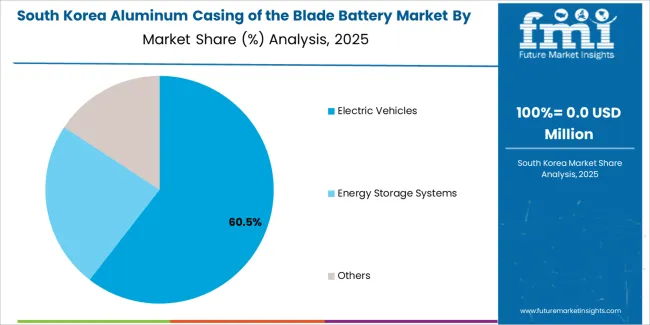
In South Korea, the aluminum casing of the blade battery market structure favors international material companies and domestic aluminum suppliers, which maintain significant positions through comprehensive product portfolios and established industrial networks supporting both electric vehicle component manufacturing and battery production installations. These providers offer integrated solutions combining advanced aluminum casing systems with professional manufacturing services and ongoing technical support that appeal to Korean manufacturers seeking reliable specialty material systems. Local aluminum processors and system integrators capture moderate market share by providing localized production capabilities and competitive pricing for automotive installations, while domestic manufacturers focus on specialized applications for electric vehicle batteries and energy storage systems tailored to Korean manufacturing characteristics and quality standards.
Channel Insights:
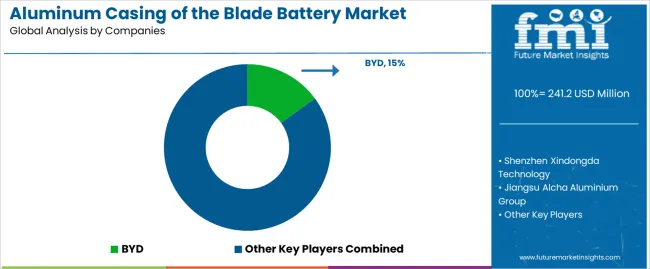
The Aluminum Casing of the Blade Battery market operates with moderate concentration, featuring approximately 12-15 meaningful participants, where leading companies control roughly 45-50% of the global market share through established electric vehicle industry relationships and comprehensive material portfolios. Competition emphasizes advanced material formulation capabilities, system reliability, and manufacturing platform integration rather than price-based rivalry. The leading company, BYD, commands approximately 15.0% market share through its integrated battery and electric vehicle manufacturing operations and extensive automotive industry presence.
Market Leaders encompass BYD, Shenzhen Xindongda Technology, and Jiangsu Alcha Aluminium Group, which maintain competitive advantages through extensive automotive material expertise, domestic manufacturing networks, and comprehensive system integration capabilities that create customer switching costs and support premium pricing. These companies leverage decades of aluminum technology experience and ongoing research investments to develop advanced aluminum casing systems with precision structural control and manufacturing monitoring features.
Technology Innovators include Jiangsu Ariel Precision Aluminum, Foshan Shhijunhongmao Aluminium Technology, and Shenzhen Bekoll Technology, which compete through specialized material formulation technology focus and innovative manufacturing interfaces that appeal to battery manufacturers seeking advanced structural capabilities and operational flexibility. These companies differentiate through rapid material development cycles and specialized electric vehicle and energy storage application focus.
Regional Specialists feature companies like Hebei Akefa Energy Saving Technology, SHENZHEN KEDALI INDUSTRY, and Wuxi JinYang New Materials, which focus on specific geographic markets and specialized applications, including aluminum-based casing systems and integrated manufacturing solutions.
| Item | Value |
|---|---|
| Quantitative Units | USD 241.2 million |
| Material Type | Conventional Type, High Strength Type |
| End Use | Electric Vehicles, Energy Storage Systems, Others |
| Regions Covered | China, India, Germany, Brazil, USA, UK, Japan |
| Countries Covered | China, India, Germany, Brazil, USA, UK, Japan |
| Key Companies Profiled | BYD, Shenzhen Xindongda Technology, Jiangsu Alcha Aluminium Group, Jiangsu Ariel Precision Aluminum, Foshan Shhijunhongmao Aluminium Technology, Shenzhen Bekoll Technology, Hebei Akefa Energy Saving Technology, SHENZHEN KEDALI INDUSTRY, Wuxi JinYang New Materials |
| Additional Attributes | Dollar sales by material type and end-use categories, regional adoption trends across China, India, and Germany, competitive landscape with aluminum manufacturers and battery suppliers, manufacturer preferences for structural strength and material reliability, integration with electric vehicle manufacturing platforms and battery production quality monitoring systems, innovations in high-strength aluminum formulations and environmental durability, and development of automated manufacturing solutions with enhanced performance and production optimization capabilities. |
The global aluminum casing of the blade battery market is estimated to be valued at USD 241.2 million in 2025.
The market size for the aluminum casing of the blade battery market is projected to reach USD 444.2 million by 2035.
The aluminum casing of the blade battery market is expected to grow at a 6.3% CAGR between 2025 and 2035.
The key product types in aluminum casing of the blade battery market are high strength type and conventional type.
In terms of end use, electric vehicles segment to command 58.0% share in the aluminum casing of the blade battery market in 2025.






Full Research Suite comprises of:
Market outlook & trends analysis
Interviews & case studies
Strategic recommendations
Vendor profiles & capabilities analysis
5-year forecasts
8 regions and 60+ country-level data splits
Market segment data splits
12 months of continuous data updates
DELIVERED AS:
PDF EXCEL ONLINE
Aluminum ROPP Closure Market Size and Share Forecast Outlook 2025 to 2035
Aluminum Cans Market Size and Share Forecast Outlook 2025 to 2035
Aluminum Foil Packaging Market Size and Share Forecast Outlook 2025 to 2035
Aluminum Pouches Market Size and Share Forecast Outlook 2025 to 2035
Aluminum Foil Tape Market Size and Share Forecast Outlook 2025 to 2035
Aluminum-Free Food Pouch Market Size and Share Forecast Outlook 2025 to 2035
Aluminum-Nickel Catalyst Market Size and Share Forecast Outlook 2025 to 2035
Aluminum Frame Monitors Market Size and Share Forecast Outlook 2025 to 2035
Aluminum Composite Materials Market Size and Share Forecast Outlook 2025 to 2035
Aluminum Flat Products Market Size and Share Forecast Outlook 2025 to 2035
Aluminum Alloys Market Size and Share Forecast Outlook 2025 to 2035
Aluminum Sheets and Coils Market Size and Share Forecast Outlook 2025 to 2035
Aluminum Foil Containers Market Size and Share Forecast Outlook 2025 to 2035
Aluminum Aerosol Cans Market Size and Share Forecast Outlook 2025 to 2035
Aluminum Extrusion Market Size and Share Forecast Outlook 2025 to 2035
Aluminum Hydroxide Market Size and Share Forecast Outlook 2025 to 2035
Aluminum Disposable Plates Market Size and Share Forecast Outlook 2025 to 2035
Aluminum Cladding Market Size and Share Forecast Outlook 2025 to 2035
Aluminum Wire Market Size and Share Forecast Outlook 2025 to 2035
Aluminum Slugs Market Size and Share Forecast Outlook 2025 to 2035

Thank you!
You will receive an email from our Business Development Manager. Please be sure to check your SPAM/JUNK folder too.
Chat With
MaRIA